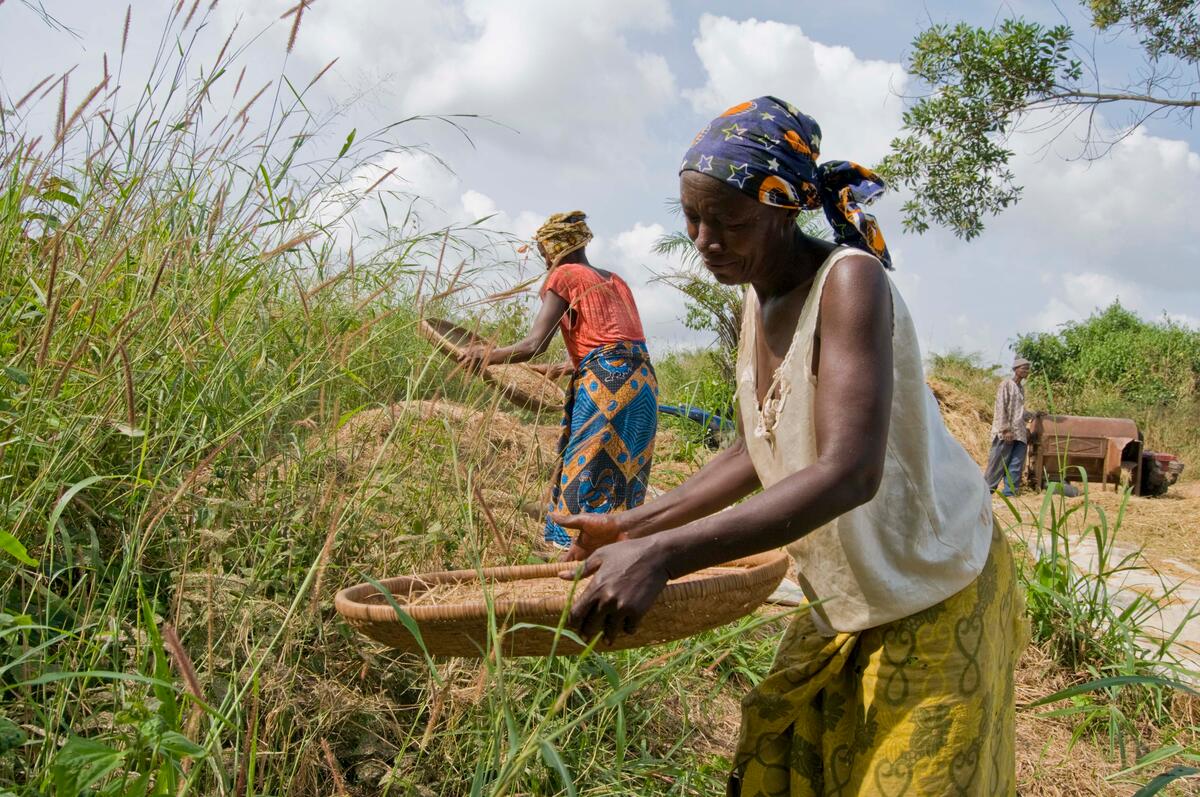16th Multidisciplinary team meeting in West Africa: A vision for social protection and sustainable agriculture
Recommendations include expanding social protection coverage to rural populations, prioritizing school feeding and nutrition programs, leveraging digital tools and e-payment systems, and adopting climate-smart agricultural practices

©FAO/Caroline Thomas
12/12/2024
The 16th Multidisciplinary Team Meeting (MDT16) in West Africa, held in Praia from 19-22 November and organized under the theme "Bridging Sectors: Enhancing Resilience of Food and Nutrition Security through Social Protection in West Africa," highlighted the pivotal role of social protection in addressing rural poverty and fostering sustainable, inclusive development.
Dr. Abebe Haile-Gabriel, FAO's Assistant Director-General for Africa, underscored the transformative potential of social protection, emphasizing its ability to combat poverty, promote inclusive rural transformation, and support those reliant on agrifood systems for their livelihoods.
The meeting, presided over by Cabo Verde’s Secretary of State for Social Inclusion, Ms. Lídia Lima, brought together senior government officials, regional stakeholders, and experts. During this event, FAO’s Subregional Coordinator for West Africa, Dr. Robert Guei, reaffirmed FAO's commitment to designing shock-responsive social protection systems integrated with agrifood sectors, enabling rural communities to adopt sustainable practices, improve nutrition, and enhance resilience.
Attendees emphasized the crucial role of international mechanisms such as the Green Climate Fund and the Global Environment Facility in addressing disparities in countries’ capacities for universal social protection, given social protection’s role in increasing resilience to climate change. Ms. Bintia Stephen-Tchicaya, FAO Representative for West Africa, highlighted also the urgency of extending social protection coverage for rural populations, noting that only 13% of the region’s population currently benefits from social protection programmes.
Field visits showcased innovative solutions in Cabo Verde, such as the impact of school feeding initiatives that provide nutritious meals to 86 000 children annually, strengthening social protection and addressing food insecurity. Ms. Ana Touza, FAO Representative in Cabo Verde, praised the government’s inclusive policies, highlighting the integration of social protection into agricultural development.
Key recommendations emerging included expanding social protection coverage to rural populations, prioritizing school feeding and nutrition programs, leveraging digital tools such as farmer registries and e-payment systems, and adopting climate-smart agricultural practices. Other important recommendations focus on extending social protection instruments to include climate financing, climate-smart agricultural practices, land tenure security mechanisms, sustainable water management, and adaptive risk reduction strategies.
The meeting concluded by reinforcing the importance of strong regional partnerships to strengthen social protection and transform agrifood systems, ensuring that no one is left behind in building a resilient and sustainable future.
Dr. Abebe Haile-Gabriel, FAO's Assistant Director-General for Africa, underscored the transformative potential of social protection, emphasizing its ability to combat poverty, promote inclusive rural transformation, and support those reliant on agrifood systems for their livelihoods.
The meeting, presided over by Cabo Verde’s Secretary of State for Social Inclusion, Ms. Lídia Lima, brought together senior government officials, regional stakeholders, and experts. During this event, FAO’s Subregional Coordinator for West Africa, Dr. Robert Guei, reaffirmed FAO's commitment to designing shock-responsive social protection systems integrated with agrifood sectors, enabling rural communities to adopt sustainable practices, improve nutrition, and enhance resilience.
Attendees emphasized the crucial role of international mechanisms such as the Green Climate Fund and the Global Environment Facility in addressing disparities in countries’ capacities for universal social protection, given social protection’s role in increasing resilience to climate change. Ms. Bintia Stephen-Tchicaya, FAO Representative for West Africa, highlighted also the urgency of extending social protection coverage for rural populations, noting that only 13% of the region’s population currently benefits from social protection programmes.
Field visits showcased innovative solutions in Cabo Verde, such as the impact of school feeding initiatives that provide nutritious meals to 86 000 children annually, strengthening social protection and addressing food insecurity. Ms. Ana Touza, FAO Representative in Cabo Verde, praised the government’s inclusive policies, highlighting the integration of social protection into agricultural development.
Key recommendations emerging included expanding social protection coverage to rural populations, prioritizing school feeding and nutrition programs, leveraging digital tools such as farmer registries and e-payment systems, and adopting climate-smart agricultural practices. Other important recommendations focus on extending social protection instruments to include climate financing, climate-smart agricultural practices, land tenure security mechanisms, sustainable water management, and adaptive risk reduction strategies.
The meeting concluded by reinforcing the importance of strong regional partnerships to strengthen social protection and transform agrifood systems, ensuring that no one is left behind in building a resilient and sustainable future.
